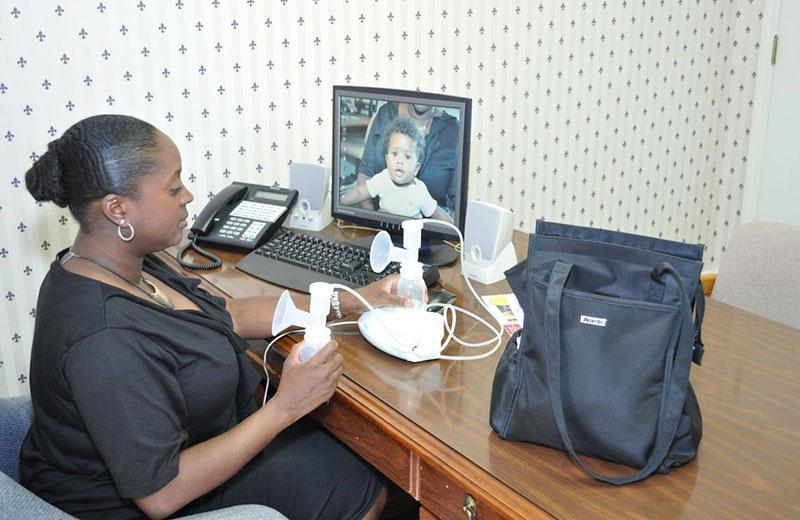After being on parental leave, Sarah returned to work while her husband stayed home with the kids. Twice a day, on her morning and afternoon breaks, he brings the youngest to her to breastfeed. On her lunch breaks, she meets them at home. This works well for their family, as she has a private office at work and their home is only 10 minutes away.
For many parents, returning to work means big changes in feeding. Some parents visit their child's daycare to nurse on lunch breaks; others pump their milk at work and give it to their child’s care provider. Either way, parents need support to make this happen.
A role for employers

October 1-7 is National Breastfeeding Week in Canada. The theme for 2023 is "Enabling breastfeeding: Making a difference for working parents."
Supporting parents in their feeding journeys is not just a "nice to do"; indeed, in BC, employers are expected to take reasonable steps to accommodate the needs of their staff. This is good for families and good for business!
When workplaces support parents to feed or express their milk at work, this helps them transition back to work and supports the health of their whole family. Studies show that staff who continue to breastfeed:
- Miss less work to care for sick children
- Are more productive
- Are more likely to stay with the organization
This means less absenteeism and less staff turnover, which means it’s an important step in supporting a sustainable workforce.
Imagine that you're a manager or supervisor, and you'll soon welcome back a staff member who has been on parental leave. How can you support their needs? Below, we share some ideas from Northern BC parents and supervisors.
Start a conversation
Be proactive! A staff member returning from parental leave may be breastfeeding, chestfeeding, and/or pumping. They may need support to continue this at work. What options might exist at your worksite?
Erin, a dietitian in Prince George, says, "It's really helpful for managers to start the conversation, to share some options, and to support your choices. This would help all staff, including those who might be unsure about asking for what they need. It supports a culture shift."
Together, explore options. Let staff decide where they would be most comfortable and what would work best for them. Then, be intentional about checking in from time to time. Ask them, "How are things going? How could things be improved?”
Engage the team around them

Where it makes sense to do so, discuss plans with other team members so they are aware, can ask questions, and can support their team members.
Natasha, a nurse in a Haida Gwaii hospital, pumped in the staff room (with a sign on the door). "My coworkers were aware and were understanding,” she says. “They helped me to take my breaks on time and knew that I’d be using part of the fridge to store my milk."
Courtenay, a team lead in Prince George, feels there's value in raising the topic at staff meetings once in a while. "This supports the staff member who is currently being accommodated,” she says, “and shows other staff that they would also be supported if they have similar needs." This, in turn, can support staff morale, loyalty, and retention.
Create a supportive culture
Further steps employers can take to ensure their workplace supports staff needs:
-
Have a written policy: This is an important way for employers to show their support for parents’ feeding goals. A policy should list steps that can be taken to support staff. Managers and supervisors should know how to support their team members.
-
Share information with staff: This could be provided in packages for new employees, those who are pregnant, and those returning from parental leave. The information could be shared in staff newsletters as well.

An ideal space includes a comfy chair and table near an electrical outlet and a sink. (Photo source: U.S. Breastfeeding Committee) Work to create dedicated spaces: Staff who breastfeed, chestfeed, or pump benefit from a private space that has a comfy chair near an electrical outlet, includes a small table, and is near a sink for washing hands and/or pump parts. This ideal may not always be possible, but privacy screens, signage, and other creative solutions can help.
Wondering how to make your worksite breastfeeding-friendly?
- Get ideas from the City of Vancouver’s policy: Breastfeeding in the workplace
- Review this tipsheet: Make breast/chestfeeding your business - Perinatal Services BC
- Share info for parents: Returning to paid employment - La Leche League Canada
- Read inspiring stories: Breastfeeding in the workplace - Northern Health Stories














Comments